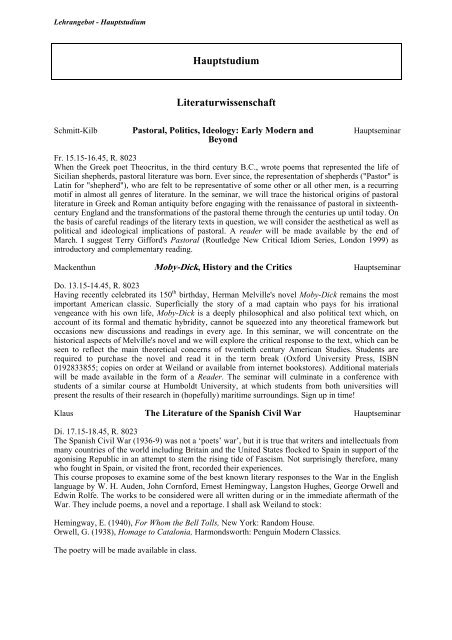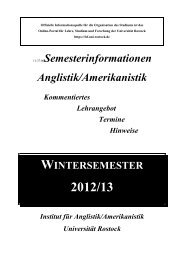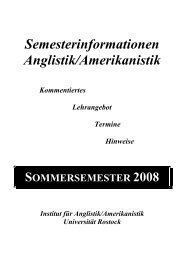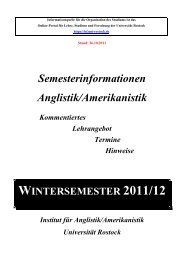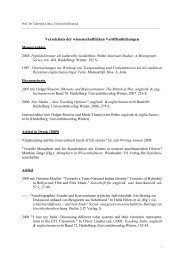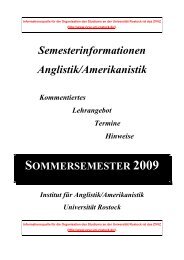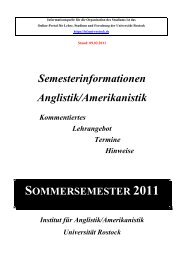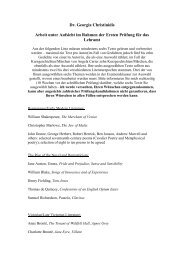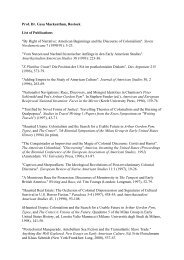SOMMERSEMESTER 2004 - Institut für Anglistik/Amerikanistik
SOMMERSEMESTER 2004 - Institut für Anglistik/Amerikanistik
SOMMERSEMESTER 2004 - Institut für Anglistik/Amerikanistik
Create successful ePaper yourself
Turn your PDF publications into a flip-book with our unique Google optimized e-Paper software.
Lehrangebot - Hauptstudium<br />
Hauptstudium<br />
Literaturwissenschaft<br />
Schmitt-Kilb<br />
Pastoral, Politics, Ideology: Early Modern and<br />
Beyond<br />
Hauptseminar<br />
Fr. 15.15-16.45, R. 8023<br />
When the Greek poet Theocritus, in the third century B.C., wrote poems that represented the life of<br />
Sicilian shepherds, pastoral literature was born. Ever since, the representation of shepherds ("Pastor" is<br />
Latin for "shepherd"), who are felt to be representative of some other or all other men, is a recurring<br />
motif in almost all genres of literature. In the seminar, we will trace the historical origins of pastoral<br />
literature in Greek and Roman antiquity before engaging with the renaissance of pastoral in sixteenthcentury<br />
England and the transformations of the pastoral theme through the centuries up until today. On<br />
the basis of careful readings of the literary texts in question, we will consider the aesthetical as well as<br />
political and ideological implications of pastoral. A reader will be made available by the end of<br />
March. I suggest Terry Gifford's Pastoral (Routledge New Critical Idiom Series, London 1999) as<br />
introductory and complementary reading.<br />
Mackenthun Moby-Dick, History and the Critics Hauptseminar<br />
Do. 13.15-14.45, R. 8023<br />
Having recently celebrated its 150 th birthday, Herman Melville's novel Moby-Dick remains the most<br />
important American classic. Superficially the story of a mad captain who pays for his irrational<br />
vengeance with his own life, Moby-Dick is a deeply philosophical and also political text which, on<br />
account of its formal and thematic hybridity, cannot be squeezed into any theoretical framework but<br />
occasions new discussions and readings in every age. In this seminar, we will concentrate on the<br />
historical aspects of Melville's novel and we will explore the critical response to the text, which can be<br />
seen to reflect the main theoretical concerns of twentieth century American Studies. Students are<br />
required to purchase the novel and read it in the term break (Oxford University Press, ISBN<br />
0192833855; copies on order at Weiland or available from internet bookstores). Additional materials<br />
will be made available in the form of a Reader. The seminar will culminate in a conference with<br />
students of a similar course at Humboldt University, at which students from both universities will<br />
present the results of their research in (hopefully) maritime surroundings. Sign up in time!<br />
Klaus The Literature of the Spanish Civil War Hauptseminar<br />
Di. 17.15-18.45, R. 8023<br />
The Spanish Civil War (1936-9) was not a ‘poets’ war’, but it is true that writers and intellectuals from<br />
many countries of the world including Britain and the United States flocked to Spain in support of the<br />
agonising Republic in an attempt to stem the rising tide of Fascism. Not surprisingly therefore, many<br />
who fought in Spain, or visited the front, recorded their experiences.<br />
This course proposes to examine some of the best known literary responses to the War in the English<br />
language by W. H. Auden, John Cornford, Ernest Hemingway, Langston Hughes, George Orwell and<br />
Edwin Rolfe. The works to be considered were all written during or in the immediate aftermath of the<br />
War. They include poems, a novel and a reportage. I shall ask Weiland to stock:<br />
Hemingway, E. (1940), For Whom the Bell Tolls, New York: Random House.<br />
Orwell, G. (1938), Homage to Catalonia, Harmondsworth: Penguin Modern Classics.<br />
The poetry will be made available in class.


